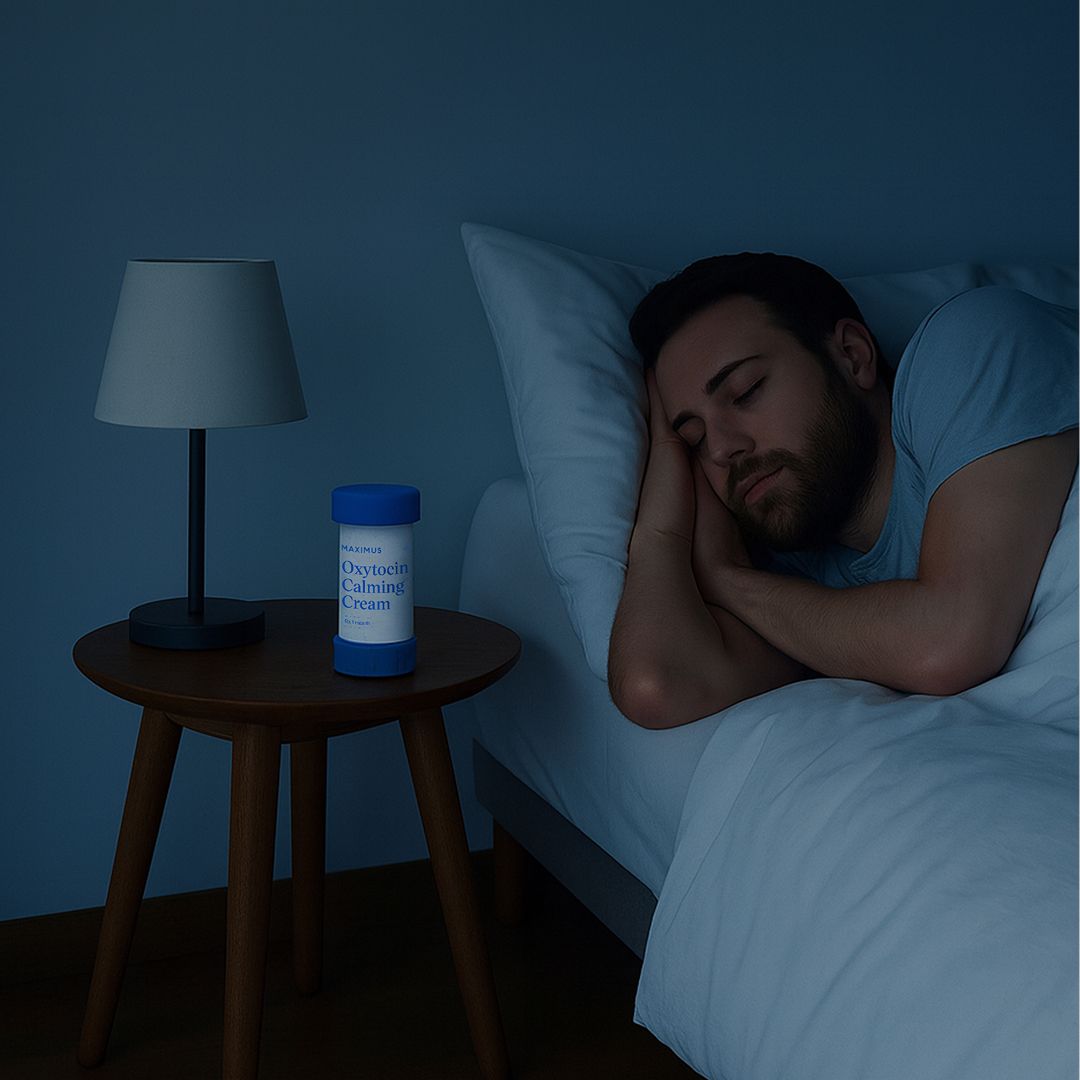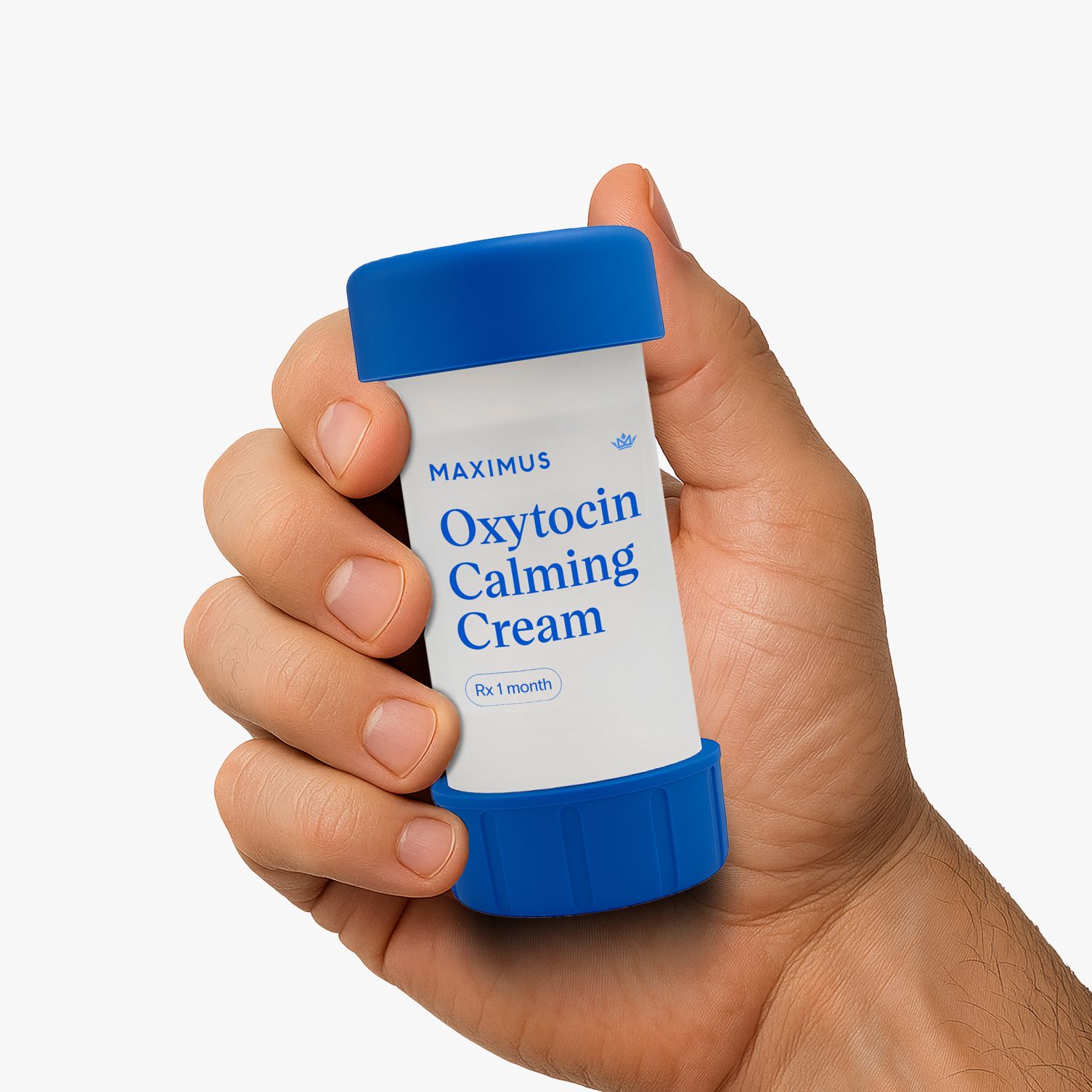Introduction
Testosterone levels gradually decline with age at an average drop of about 1% per year after age 30. And health conditions like diabetes, obesity, stroke, and liver disease may be contributing factors. In the past, testosterone replacement therapy (TRT) was the only suitable treatment, but these injections, pellets, patches or gels containing synthetic testosterone were associated with a number of adverse side effects like testicular shrinkage, infertility, and dependence. Enclomiphene is a safe TRT alternative, which helps to restore your body’s own natural production of testosterone without harmful side effects.
This article will show you how enclomiphene works, how it compares to TRT treatment, and how to tell if enclomiphene is right for you.
Key takeaways:
- Enclomiphene citrate is a medication used to restore your body’s own natural production of testosterone while maintaining your sperm count.
- Enclomiphene boosts testosterone production by increasing levels of FSH and LH and blocking estrogen.
- Testosterone replacement therapy also helps to boost testosterone, but it has risks ranging from testicular shrinkage and acne to decreased sperm production.
- Clomiphene citrate, or Clomid, is another alternative to testosterone replacement therapy and contains enclomiphene, but it also contains zuclomiphene. Zuclomiphene is an estrogen agonist, which increases estrogen and stays in your system longer than enclomiphene.
What is enclomiphene?
Enclomiphene citrate is the purified isomer of Clomid (clomiphene citrate), a non-steroidal selective estrogen receptor modulator (SERM) that has been prescribed since 1967 to treat ovarian dysfunction in women. It has also been used off-label to treat low testosterone.
SERMs like enclomiphene and clomiphene act as estrogen antagonists by binding to hypothalamic estrogen receptors in the brain. This tricks the body into thinking that it’s not getting enough estrogen, thus stimulating the production of the hormones luteinizing hormone (LH) and follicle stimulating hormone (FSH).
How enclomiphene affects testosterone levels
Studies show that by raising levels of LH and FSH through estrogen blocking, enclomiphene successfully increases serum testosterone levels. This is achieved without negatively impacting semen parameters, leading experts to recommend enclomiphene as the primary medication to treat testosterone deficiency while maintaining fertility.
Why testosterone?
Considered the primary male sex hormone, testosterone is responsible for the development of male secondary sex characteristics like voice deepening, facial hair, and muscle mass. It also plays an important role in sperm production, libido, sexual function, and even your mood.
Testosterone levels vary throughout the day and tend to decline over time. According to the American Urological Association, normal levels range from 450-600 ng/dL, while low levels are considered to be below 300 ng/dL. Low testosterone has been linked to low libido, impotence, small testicles, reduced sperm count and infertility.
How enclomiphene affects sperm count
In addition to increasing testosterone levels, enclomiphene tablets have also been shown to increase sperm count. In one 2013 study, enclomiphene citrate elevated sperm counts in seven out of seven men at three months and six out of six men at six months with sperm concentrations in the 75-334 × 10(6) /mL range.
Other benefits of taking enclomiphene
While boosting your testosterone and sperm count can help improve your overall fertility, there are other benefits to taking enclomiphene.
Optimized testosterone has been linked to:
- More lean mass: Studies show that testosterone helps to support healthy weight loss by increasing your metabolism. This results in more lean body mass and muscle growth.
- Higher sex drive: Testosterone is closely linked to libido, with higher levels associated with higher sex drive. There is also some evidence that optimized testosterone may also improve erectile dysfunction (ED).
- Improved mood: From brain fog to anxiety, low testosterone can also affect one’s mood and cognitive function. Research shows that boosting testosterone levels correlates with improved quality of life, including more sociability, concentration, and self-confidence.
How does enclomiphene compare to testosterone replacement therapy?
Enclomiphene is a safe alternative to TRT treatment, which has risks ranging from testicular shrinkage and acne to decreased sperm production. While both treatments are intended to boost testosterone levels, enclomiphene restores the body’s natural ability to create testosterone instead of replacing it with synthetic testosterone.
In a six-week study comparing enclomiphene citrate to transdermal testosterone, researchers found that both testosterone treatments increased levels of total testosterone within two weeks, but they had opposite effects on FSH and LH levels. While enclomiphene consistently increased serum total testosterone, LH and FSH, transdermal testosterone suppressed LH levels. Research has indicated that low LH levels are associated with sexual dysfunction, decreased spermatogenesis, and infertility. In addition, the six-week study revealed that seven days after cessation of treatment, total testosterone levels in men receiving enclomiphene citrate were higher than those receiving transdermal testosterone.
And in a three-month study comparing enclomiphene citrate to topical testosterone, researchers also found that while both testosterone treatments increased testosterone, those taking topical testosterone experienced a significant decline in sperm concentration. This decline rendered more than half (54%) of men in the study to become oligospermic.
How does enclomiphene compare to clomiphene citrate?
Clomiphene citrate, which also goes by the name Clomid, is made up of a mixture of two isomers: 38% zuclomiphene and 62% enclomiphene. You already know that enclomiphene works as an estrogen antagonist, but zuclomiphene does not. Zuclomiphene is an estrogen agonist, which increases estrogen and stays in your system longer than enclomiphene.
Clomid is also associated with a number of adverse side effects, such as:
- Mood swings
- Irritability
- Anxiety
- Gynecomastia (increased breast tissue)
- Acne
- Vision problems
Does enclomiphene have side effects?
The most common side effects of enclomiphene are increased libido, acne, and aggression. There are no reported drug interactions. Less commonly, the following side effects have been observed in a small number of users: headache, nausea, diarrhea, dizziness, common, hot flush, and joint pain.
Who should take enclomiphene?
Enclomiphene is ideal for those who wish to increase their testosterone levels without compromising their sperm count.
Symptoms of low testosterone include:
- Low sex drive
- Trouble getting or maintaining an erection
- Low sperm count
- Insomnia
- Decrease in muscle size and strength
- Bone loss
- Increase in body fat
- Depression
- Difficulty concentrating
The Maximus Testosterone Protocol can help you get the most out of your enclomiphene treatment. Along with your prescription of enclomiphene tablets, the protocol includes CLIA-certified lab tests shipped to your door, which allow you and your doctor to monitor your testosterone levels before and after starting treatment. You’ll also receive live coaching and community support to amass tips on nutrition, exercise, sleep, focus, and more.
Learn more about the Enclomiphene Testosterone Protocol.
Other ways to boost testosterone
Taking a testosterone medication like enclomiphene can help boost your testosterone, but it’s not the only way. There are a number of healthy lifestyle factors that support normal testosterone levels and implementing them alongside enclomiphene can produce profound results.
Here’s how you can boost your testosterone naturally:
- Exercise regularly and maintain a healthy weight
- Get adequate sleep
- Follow a nutritious diet and avoid processed foods
- Cut back on alcohol and stop smoking
- Reduce your stress levels
Limit exposure to endocrine disruptors by choosing BPA and PFA free products and avoiding plastics
Learn more about enclomiphene and get started.
Disclaimer: The contents of this article, including, but not limited to, text, graphics, images, and other information, is for information purposes only and does not constitute medical advice. The information contained herein is not a substitute for and should never be relied upon for professional medical advice. The content is not meant to be complete or exhaustive or to be applicable to any specific individual's medical condition. You should consult a licensed healthcare professional before starting any health protocol and seek the advice of your physician or other medical professional if you have questions or concerns about a medical condition. Always talk to your doctor about the risks and benefits of any treatment. Never disregard or delay seeking professional medical advice or treatment because of something you have read on this site. Maximus does not recommend, endorse, or make any representation about the efficacy, appropriateness, or suitability of any specific test, products, procedures, treatments, services, opinions, healthcare providers or other information contained herein. Maximus is not responsible for, nor will they bear any liability for, the content provided herein or any actions or outcomes resulting from or related to its use.





